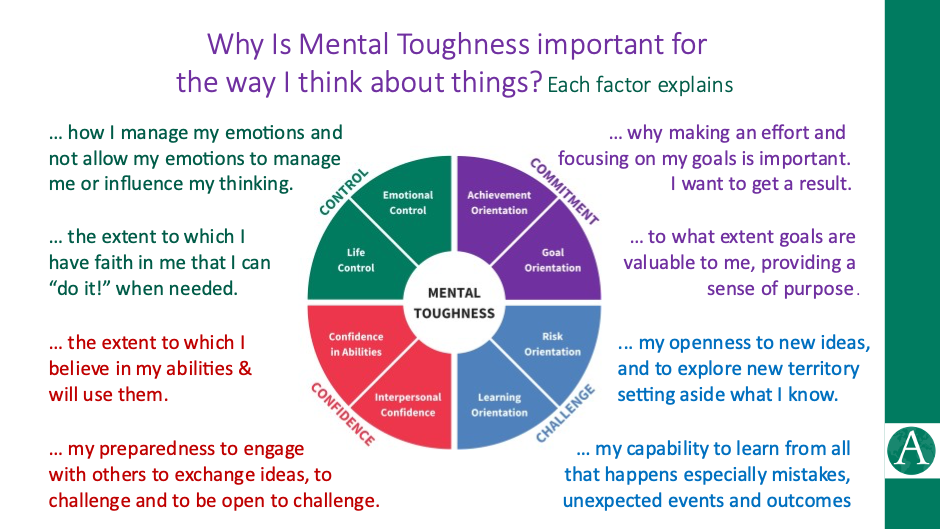If I use my super-power we can all thrive
As the leading organisation bringing this concept to practitioners the world over, one of our greatest challenges is dealing with the preconception that if you are mentally tough you will succeed at most things more than would the mentally sensitive.
It is true that mental toughness can give us an advantage in many settings that are important in our life and our work. But it’s not always the case and not as simple as that.
In the first place, there are 8 factors which combine to produce an overall level of mental toughness. It is possible to be mentally tough or mentally sensitive (the opposite of mental toughness) on each factor.
In many cases, a person with a reasonable level of mental toughness might have a degree of mental toughness on, say, five factors and a degree of mental sensitivity on the other three.
So, many who appear to be mentally tough will have significant areas of mental sensitivity. Similar to an apparently fit person having a misfiring heart.
Let us first explore why being mentally tough can be a problem.
We associate lots of valuable behaviours with high levels of mental toughness. We can summarise these below.

But there are three (perhaps four) reasons why the mentally tough can struggle despite their apparent advantage. We call these the three Is. All three are closely related to the extent the mentally tough (or the mentally sensitive) are self-aware of their profile and its consequences. We can consider:
The Icarus Effect – believing you are good at most; With Control that might be believing you can tackle anything when you really cannot. With Commitment, that might manifest itself as setting too many or too unrealistic goals resulting in burnout.
High levels of challenge can mean taking too many risks, also getting excited by new opportunities and being easily distracted from the task at hand. Over Confidence can mean believing you have abilities which you don’t possess and with interpersonal confidence, you can dominate others preventing them from contributing.
Ultimately they can attempt to succeed in situations where they cannot succeed. Like Icarus, they try to fly too high and get burned.
The Intolerance effect – a failure to recognise that others are not like you and being intolerant of that gap, resulting in showing that intolerance – even when others bring other useful attributes to the party.
For example, it’s not uncommon for those with a high level of Control to say “I can do it, why can’t you?” …. and all the while you could do a perfectly good job but it’s not as good as they can do. The highly committed will often look down on those with less drive and commitment.
Those with a high level of Challenge will similarly dismiss those who don’t want to change or do new things at the same pace as them.
It can be very damaging when someone with a high level of confidence in their own abilities dismisses another’s abilities. Those with high levels of interpersonal confidence can dismiss others abruptly sometimes to the point of becoming verbal bullies.
Ultimately they can alienate others by treating them indifferently or even badly. A key mistake is when we are all dependent on the support and contribution of others.
The Icon Effect – There is no doubt that being mentally tough on some or all of the eight factors can give rise to an advantage in many settings. Your attributes can appear exceptional, even superhuman, to others. They can be respected, even admired.
They can also be overawed and become reluctant to engage because they feel inferior. They can be intimidated by the mentally tough without the mentally tough seeking to do that.
None, all, or some of these effects can occur within an individual.
The key, of course, is to develop self-awareness about your level of mental toughness and reflect on its implication for what you are doing, what you are seeking to achieve and how you will engage with others to be able to optimise things for everyone.
The downsides are summarised in this image.

On reflection, all this might point to a fourth I – Ignorance. Ignorance about who you are and how you impact society, at work and at home.
We would argue that, if there is a superpower here, it’s this Self Awareness about your mental approach to events. It matters for both mental toughness and mental sensitivity.
Not easy because your mental approach is largely invisible, it’s in your head. You can’t see it and others can’t see it.
So the superpower is to become self-aware about your mental responses when things happen to you and around you, making “the invisible, visible”.
And, in time to be able to understand others’ mental responses so that you can optimise their impact and you can support them to manage the downsides that we all can possess.
The eight factors provide the framework for developing this superpower.
The development of a high-quality psychometric, based on the same framework, the MTQPlus, gives the ability to make reasoned assessments which lead to development.
For information about learning about the 4Cs mental toughness concept, and becoming a licensed user of the MTQ suite of measures contact: headoffice@aqrinternational.co.uk
The MTQPlus measure is available in 14 languages, accessible to more than 2/3rds of the world’s population.
Completion of the AQR Licensed user training programme is recognised by EMCC and ICF for CPD purposes.


